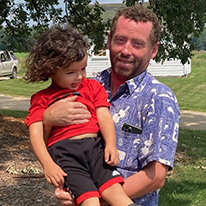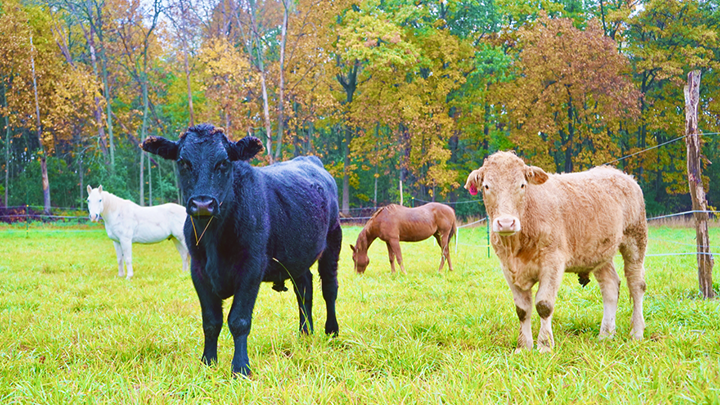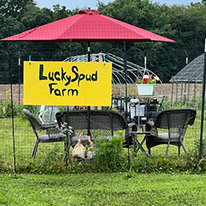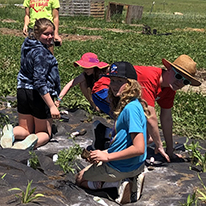Owner: Dan Cornelius
What they grow: Indigenous corn, squash, and wild rice, pasture-raised chicken, duck eggs, grass-fed cattle
Where you can buy from Yowela?talí^ Farms: Direct from Dan! Contact Dan Cornelius (daniel.cornelius@gmail.com) or look for him at the Dane County Farmers’ Market

Dan Cornelius leases 5 acres at the northern side of Silverwood Park where he is experimenting with growing indigenous crops using regenerative farming methods. In 2021, Dan introduced livestock to his acreage, the first to be brought to Silverwood Park. “What I’m doing on my acreage is trying to mimic how the grazing animals like buffalo used to move across the landscape,” Dan explained.
Silverwood’s soils, exhausted from decades of conventional farming, need the boost that livestock grazing can bring. Soil regenerates more quickly when animals are pastured on it because their hooves break it up and their waste adds nutrients, both of which improve the soil. You can learn more about regenerative grazing here.
“The location is good for livestock,” said Dan. “It’s well sheltered from the wind in winter, and shaded by the woods to the southwest in the summer.” He plans to continue the grazing experiment into next year and is designing his internal fencing system with the animals’ need for access to shade and shelter in mind.
The first year’s experiment taught Dan a good deal about how to keep grazing animals in—and keep critters out. “The reason I’ve had to make the fences so high is not so much to enclose the livestock but to keep out the deer,” he observed. All of the fencing used is electrified with solar power using a combination of poly plastic and high-tensile wire. “The horses respect electricity, but the steers have been more determined until I added a couple more lines,” Dan said.
All four of the animals that Dan pastured at Silverwood Park in 2021—two horses and two steers—have come from the Blackfeet Indian Reservation in Montana where Dan, an enrolled member of the Oneida Nation, spends time. The white horse is named Walter and the chestnut, Aquaknot.
Like other growers at Silverwood Park, Dan wants to build the food value chain by selling direct to consumers and thus capturing more of the sale price for the growers, rather than middlemen. “Where these animals come from, almost all of the ranchers are in the commodity market,” said Dan. “They sell calves at auctions to meatpackers, and there are huge fluctuations in the market. It makes it tough to cover your costs.” Meat from the first steer is now available for purchase along with wild rice and Indigenous corns.
Building relationships directly with consumers is beneficial all around; growers earn more, and people know more about where their food comes from. The steers at Silverwood Park are part of that overall effort.
The horses, of course, are on the land for their benefit to the soils, not for the dinner table. They may occasionally be on Dan’s land this winter, as part of his experiment. Both horses receive regular veterinary care. They get their nutrition through grazing and supplemental feed and vitamins. “The biggest thing is making sure they have access to quality pasture and of course plenty of water,” said Dan. Anyone curious about the horses’ safety and comfort outdoor in winter will find useful information on the University of Minnesota’s Extension’s website, here.
Next season, Dan plans to continue the experiment. “We hope to introduce more grazing animals into this restored native prairie, in a way that is not detrimental. We’re being conservative and cautious at the beginning,” Dan explained. “Part of my experiment this winter is to see how well they graze that bluestem, and how much supplemental hay they need.”
Next summer, Dan has plans to rotate the animals within the fenced area for shorter periods, frequently moving them onto fresh grass. Grazing helps to remove invasive species and allows for maximum growth of the desired plants.
Like all farmers, Dan has faced challenges from weather and finding just the right crop plan to work with the specific acreage he’s farming. “I’ve been trying to get no-till to work and I think it can,” said Dan, acknowledging it has not been easy.
Dan has been an active member of the Grower-Partner community at Silverwood Park. He was the lead organizer behind Regenerative Agriculture Field Day at the park in August, 2021. Read a blog post about that day here.
Interview by Sarah White



